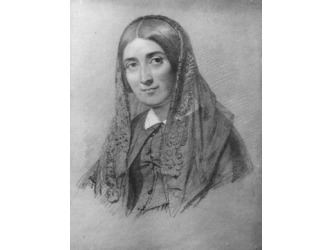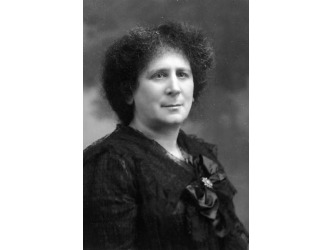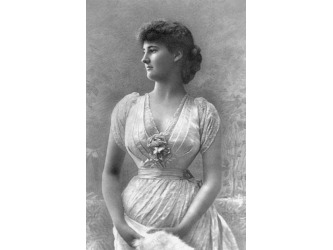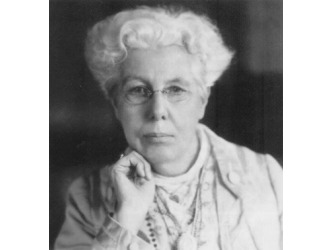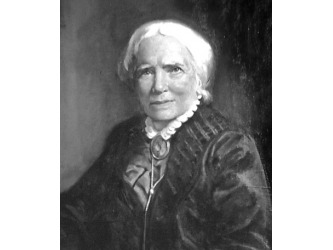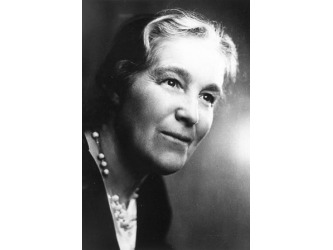SLINDON
Marie Belloc Lowndes (1868–1947) author
The daughter of Bessie Rayner Parkes, she was born in London, spent two years at a convent school at Mayfield then lived with her mother in Slindon. Raised bilingual, she began to write about France, earning an income that helped support the family and send her brother to Oxford University, where his excellent education led to a lucrative writing career. He repaid his sister by becoming a fervent opponent of women’s higher education, and while she was president of the Women Writers’ Suffrage League he was the most prominent and vocal anti-suffragist of his day. In 1896 she married Frederick Lowndes of The Times editorial staff. They had a son and two daughters and led a busy social life that included visits to her close friend Alice Meynell and to Number Ten, by invitation of her friend Margot Asquith, wife of the Prime Minister and mother-in-law of Cynthia. Unlike her brother, her husband was an advocate of women’s rights and used a £2,000 legacy to support her career. She wrote seventy books (each with a quill pen), including romance and crime novels, short stories, royal biographies and plays. Her best known work was The Lodger: A Tale of the London Fog (1913), about a couple who suspect their lodger is Jack the Ripper. This sold a million copies in twenty years and was adapted into a play, a Hitchcock film and an opera. The film of her novel Letty Lynton, a tale of love and blackmail, appeared in 1932. In widowhood she wrote a four-volume autobiography In a Passing World (posthumous, 1948) while living between her home in London and that of her elder daughter Elizabeth Northcote, Countess of Iddesleigh, at Parfitts House, Longwater Lane, Eversley Cross, Hampshire, where she died. Her requiem mass was held in Westminster Cathedral. The Lodger and some of her other works were reprinted in 2003–5. Her daughter Susan edited and published The Diaries and Letters of Marie Belloc Lowndes in 1971.
WORTHING
Gladys Morgan (1898–1983) comedian
A Welsh-born soprano, her beautiful singing voice won her a part in a children’s touring concert party; later she formed a musical trio then became part of Carrie Laurie’s Juveniles, where she met comedian Frank Laurie. They married and formed a double-act as straight-woman and comedian, which became successful once they swapped roles. After forty years in revue and variety, she won a spot as resident comedian on a BBC radio show, Welsh Rarebit, broadcast from Cardiff. She dropped her phoney Lancashire accent in favour of her native one and had audiences rocking with laughter with her homely routines and songs. This led to invitations to appear at top variety theatres and on TV and radio and in 1956 she addressed the Women of the Year luncheon at the Savoy Hotel, representing women in broadcasting. Nicknamed ‘Funny Chops’, her trade-marks were a blazer and beret, a toothless grin and a ridiculously infectious, maniacal laugh. In the mid-fifties she appeared regularly on The Frankie Howerd Show and after she joined the cast of Educating Archie the need to be at the recording studio in London every Sunday prompted her to move the family in 1958 from the north of England to Salisbury Road in Worthing, where she lived for the next quarter-century. In 1959 she appeared on TV’s The Anne Shelton Show. Through the 1960s she topped the bill in summer variety shows and pantomimes, appearing in venues as diverse as Butlins and the London Palladium. She expanded her act to become ‘Gladys Morgan and Family’, comprising her husband, daughter Joan, son-in-law Bert Holman and the family dog. They completed five seasons in Australia and four sell-out summer tours of South Africa, where they had their own series, The Morgans, on Springbok Radio. She appeared with Bud Flanagan in the film The Wild Affair (1963) and took over from Anthea Askey as the Worthing compère of Search for a Star, a national talent competition. Mrs Morgan died in Worthing, and in 2007 BBC Radio Wales broadcast a special programme celebrating her life and work.
